Work hours, jobs, and rates in the Philippines

The normal and allowable working hours in the Philippines are eight hours per day. If employees are required to work beyond those hours, the company must compensate additional job pay rates for the hours rendered.
40 hours is the maximum per week, although the law allows companies to employ part-time workers, who usually work less than eight hours (usually half the time, which is four hours).
The usual overtime job pay rate in the Philippines is 25% of the hourly rate during regular workdays and 30% of the hourly rate during rest days and regular and special holidays.
Every employee in the Philippines is entitled to get an additional job pay rate for overtime work, except for the following:
- Managerial personnel
- Piece-rate staff
- Government workers
- House helpers
- Non-agricultural field personnel
Since the Philippines is one of the largest call center industries in the world, local labor laws require a “night differential” job pay rate for agents in the sector.
Most BPO clients in the country are from the USA or the UK, so most workers come to the office during the graveyard shift.
This is why call center workers — or any employee working the night shift — are required to receive an additional job pay rate of 10% if they work between 10 PM and 6 AM.
They receive the ND on top of their regular rate, and sometimes, it even comes with a “hazard rate” for those who are coming in at work during nighttime.
Overtime pay
The minimum wage is based on a workweek of 40 hours or eight hours per day. The 60-minute lunch break workers have daily is not counted as a work hour and is not compensated.
The overtime job pay rate is given to individuals who need to work beyond the regular 8-hour work shift.
- On regular days, workers should get an extra job pay rate of 25% of their hourly rate for every overtime hour rendered.
- On rest days and regular or special holidays, they should get an extra job pay rate of 30% of their hourly rate on that specific rest day or holiday for every extra hour rendered.
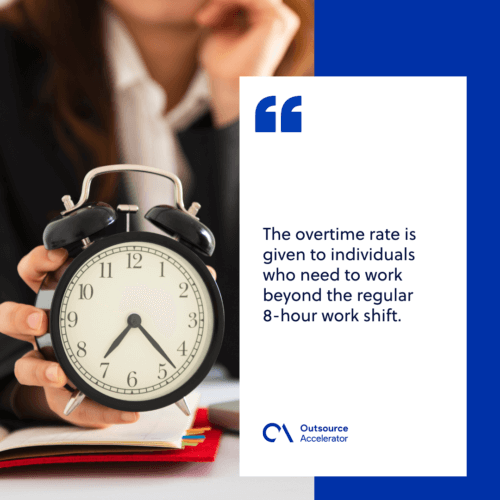
Premium wage
Employees who report for work on rest days and special holidays receive premium wages. There are three special holidays in the Philippines: Ninoy Aquino Day, All Saints Day, and the Last Day of the Year.
- On rest days or special holidays, workers get an additional job pay rate of 30% of their daily basic rate.
- On rest days that fall on special holidays, they also get an additional job pay rate of 50% of their daily basic rate.
- On regular holidays that also fall on rest days, an additional 30% based on their regular holiday job pay rate of 200% is provided.
“No work, no pay” is a principle that applies on special non-working holidays and other special days proclaimed by the President of the Philippines.
This means that the people who take time off work on holidays that are declared as such will not get their salaries for that date.
Philippine holidays and payments in outsourcing
The Philippines is a very festive country. It has a lot of holidays every year. Moreover, the structure of Philippine holidays can be rather complex. There are two types of holidays in the Philippines: Special and Regular.
It is the company’s discretion if they want their workers to come in during a regular or special holiday. If they decide to have their agents come to the office during a special holiday, they must provide the employee with an additional job pay rate of 30% on top of their regular daily rate.
For regular holidays, organizations must give their staff double their regular daily job pay rate if they ever decide to have the employee come in during that specific regular holiday.
For both regular and special holidays, employers must give their work staff salaries even if they did not come to work during that day, as long as both parties have agreed to it.
In the Philippines, business process outsourcing workers are used to coming to work during holidays, as this is usually what the BPO industry requires. Some are even serving to have perfect attendance in their companies every year.
The Philippines, USA, Australia, and the UK have different sets of holidays; thus, the companies decide which set of holidays they want to follow.
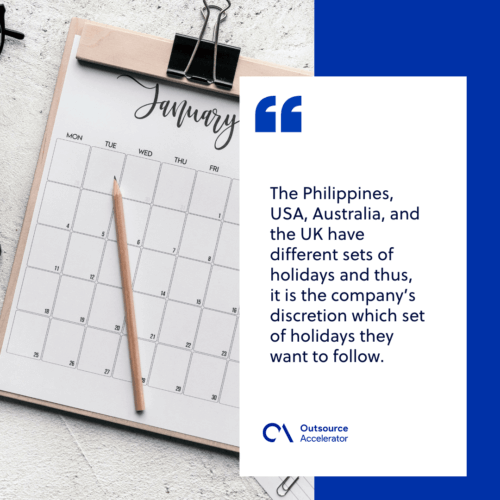
The 12 regular holiday days listed are just the tip of the iceberg. In practice, there can be as many as 25-30 holiday days in a year.
Once you add an employee’s annual holiday and sick leave allowance, it can start to have a dramatic impact on productivity.
It is worth noting, though, that sick leave rates are generally higher in the Philippines than in a lot of other countries despite the so-called cheaper labor in the country.
The holiday system can also be slightly confusing, as some special holidays can be announced only days or weeks before the day. Other holidays can be isolated or localized to different areas or communities (e.g., just a part of Manila), and some holidays are celebrated but aren’t non-working days.
When outsourcing to the Philippines, holiday policies need to be discussed and understood in advance.
Mastering Philippine national holidays is one thing, but it gets even more complex when you coordinate with another country’s holidays.
Unless a conscious, pragmatic approach to holidays is taken, you can lose a lot of productivity. Not only that, it is not uncommon for workplace frustrations and jealousy to occur as a result of one team (in one country) getting more holiday than another team (in another country).
On the upside, the outsourcing industry is very familiar with shifting schedules and commonly covers all holidays (even Christmas if necessary).
The employer has to provide higher rates for people working on holidays, but this can often be a win-win, as workers appreciate the extra job pay rate, and it isn’t that significant for most Western employers.
The key to successfully operating in the Philippine call center industry — or really in any industry in the country — is to be aware of the holidays (in both countries) and be clear about a holiday policy.
So that you can be clear, the employer needs to know what their needs are for their business and clients. Many people come to the Philippines because of a 24/7 customer support need.
So, in that case, it is obvious that a full cover is needed regardless of holidays. Others might just want Monday to Friday – and available for all working days in their “home country.”
Holidays are not a major hurdle if you are aware of the local and national holidays in advance and make good policies to manage them.
Holiday pay
Individuals that don’t go to work on a regular holiday are entitled to their basic daily wage. Should they report for work on that day and render a complete 8-hour shift, they are entitled to 200% of their daily wage.
If the holiday falls on a rest day, then they get an additional job pay rate of 30% based on their holiday rate, which totals 260% of their regular daily job pay rate.
There are 12 regular holidays in the Philippines. These include the following:
- New Year’s day
- Maundy Thursday
- Good Friday
- Araw ng Kagitingan
- Labor Day
- Independence Day
- National Heroes’ Day
- Eid’l Fitr
- Eid’l Adha
- Bonifacio Day
- Christmas Day
- Rizal Day
Night shift differential
Call center working hours in the Philippines usually have three shifts throughout the day. This is so that they could cover all their tasks for foreign clients from any part of the world.
Every call center agent or any other industry worker scheduled to work during graveyard shifts — which fall between 10 pm to 6 am — is entitled to an additional 10% premium for every regular work hour. This usually applies to call center workers, whether team leaders or simple agents, in BPO companies in the country.
13th month pay
The 13th month is a taxable and mandatory benefit that employers must provide to their workers. This is usually given to workers below the managerial rank during the 11th or 12th month of every year (but no later than December 24th of every year).
The employee must be working for at least one month in an organization for them to be able to receive their 13th-month job pay rate.
According to DOLE, the 13th month must not be less than 1/12 of the employee’s basic wage for the whole calendar year. Separated and resigned workers are entitled to a pro-rated 13th-month job pay rate, which will usually be included in their back pays.
The 13th month is different from a Christmas bonus. While the 13th month is mandated by law, the Christmas bonus is a separate payout and entirely up to the employer if they wish to do so or not.
Nevertheless, the Christmas bonus can come in other non-monetary forms, such as gift certificates, Christmas baskets, team-building activities, etc.
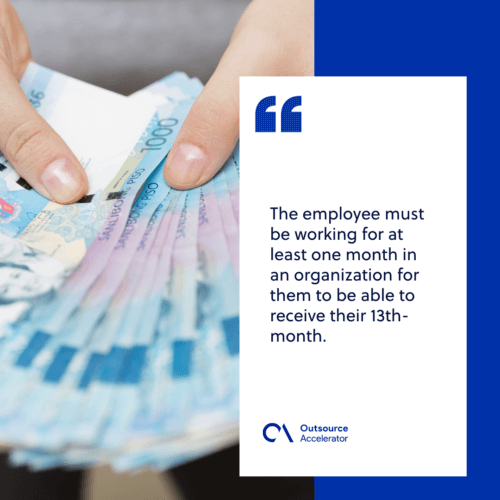
Gross benefits and de minimis benefits
Gross benefits include the 13th-month job pay rate, Christmas bonuses, incentives, productivity bonuses, and other benefits, in cash or in-kind, of the same nature. These are exempt from tax as long as the total amount falls below PHP 90,000 or around USD 1,738.
De minimis
De minimis benefits are usually what BPO companies provide to reward their Filipino workforce. They are much easier to give and seem more thoughtful since the gifts seem more personal.
Call centers in the Philippines frequently incentivize every team leader and agent annually. That is why any job opportunities in the call center industry are attractive to many Filipinos.
Workers often get motivated with de minimis benefits because, aside from their salaries, they get extra pampering from their employers.
- Medical cash allowance for dependents or a discounted or completely free-of-charge medical health card
- More or less 10 days of vacation and sick leave
- Parental leaves (maternity, paternity, and solo parent leaves)
- Emergency leaves (company’s discretion)
- If the vacation leaves are unused, some or all can be converted to cash
- A total of PHP 1,500 for rice subsidy, or one sack of rice every month
- Clothing allowance (not exceeding PHP 5,000 per year)
- Medical benefits, including a health card (the annual limit will always depend on the employer and the plan)
- Laundry allowance
- Additional employee achievement awards – These are very common in the BPO industry, as companies usually form teams made up of call center agents, and whoever hits the target or goes beyond it usually gets bonuses and incentives. It can be in the form of tangible personal property, cash, or gift certificates.
- Daily meal allowance in case the need for overtime work arises
Loans
Companies in the Philippines usually offer help to their workers through loans. The employee must be staying with their employers for more than six months, and they have to be regularized.
Many Filipinos are also eligible to apply for automobiles, housing, and even business loans with the help of their organizations. A certain amount shall be deducted from the employee’s wage every month to cover the fees for the loan.
However, workers must be careful when applying for loans, as they have to make sure that they can fulfill their monthly contributions. Failure to give monthly compensation can lead to huge interest rates and penalties, which can be much harder to settle.
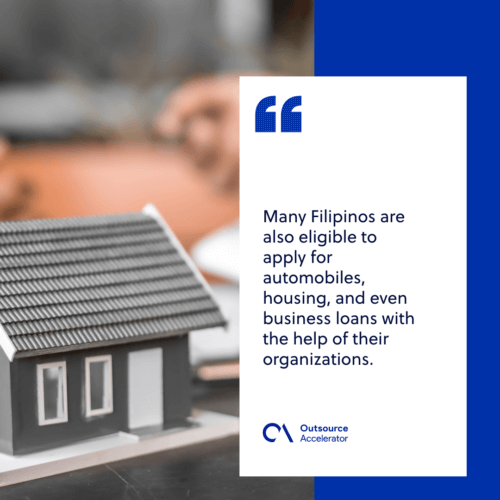
Separation and retirement
Every employee in the Philippines must be given separation and retirement pay once they decide to cease their employment with the organization they are working for.
According to articles 283 and 284 of the labor code of the Philippines, workers are entitled to claim their separation pay if their contract ends or has been seized under authorized causes.
Those who are terminated due to negligence, crime, fraud, or breaking a rule from the contract and the law are not entitled to this compensation.
A separation job pay rate for a half-month wage can be claimed due to the following circumstances:
- The employee contracted an incurable and infectious disease that can be hazardous to other employees, thus leading to the cessation of the contract
- The business recently experienced serious losses or financial difficulties, thus leading to the cessation of operations
- Loss prevention or retrenchment of a person
Separation for a full month can be claimed due to the following authorized causes:
- Employee and/or task redundancy
- Labor-saving devices
- When the business cannot reinstate the employee for reasons beyond the employer’s control
Both the employer and the employee — whether in the BPO sector or in other industries — have the right to terminate the written contract anytime through a written notice. Both the employer and employee shall give a 30-day notice before the contract cessation date.
Employees who have reached the age of 60 have the option to retire. When they reach the age of 65, retirement is compulsory.
Retirees must have served the company for five years and above for them to be qualified to receive their retirement pay. It must be equivalent to ½ of a month’s wage for every year of service.
Each ½ month’s salary must include 15 days of salary based on the last payout, ½ of the 13th-month job pay rate, and five days of incentive leaves.
Both separation and retirement fees are only made possible if you have your own business set up in the Philippines. Otherwise, the third-party BPO company will be the one to take care of such.
A lot of companies in the United States, the United Kingdom, Australia, and other countries have tried to outsource in the Philippines, and the success rate is amazing.
According to Credit Donkey, over 90% of companies look into outsourcing to cut costs. They have tried it, and they never looked back.
A closer look at mandatory deductions and benefits
Every month, taxes and mandatory benefits are deducted from an employee’s basic salary. These deductions include the following:
Taxes
The enactment of the TRAIN Law in early 2018 resulted in the lowering of the personal income tax for every worker. Minimum wage employees or those earning up to PHP 250,000 or USD 4,829 job pay rates are exempt from paying tax.
The Department of Finance (DoF) has a convenient calculator that can help employees determine their deductibles, including how much they must contribute to the SSS, PhilHealth, and HDMF.
Social Security System
The Social Security System, or SSS, is a mandatory social insurance program run by the state and provides various benefits to all professional, private, and informal employees in the country.
Social Security System (SSS) members can use the following benefits:
- Sickness – Members will receive a daily cash allowance if they are not able to work due to illness or injury.
- Maternity – Female members who are unable to work due to pregnancy or miscarriage are granted a daily cash allowance.
- Disability – Members who have become partially, totally, or permanently disabled will receive cash benefits in the form of a monthly pension or a lump sum.
- Retirement – Members who can no longer work due to old age are granted a cash benefit in the form of a monthly pension or a lump sum amount.
- Death – This cash benefit, which can come in the form of a monthly pension or a lump sum amount, is granted to the beneficiaries of a deceased member.
- Funeral – This cash benefit is given to whoever paid the burial expenses of a deceased member.
- Salary loan – This cash loan is granted to currently paying voluntary, self-employed, and employed members.
Government employees have their own version of the SSS, which is the GSIS or Government Service Insurance System.
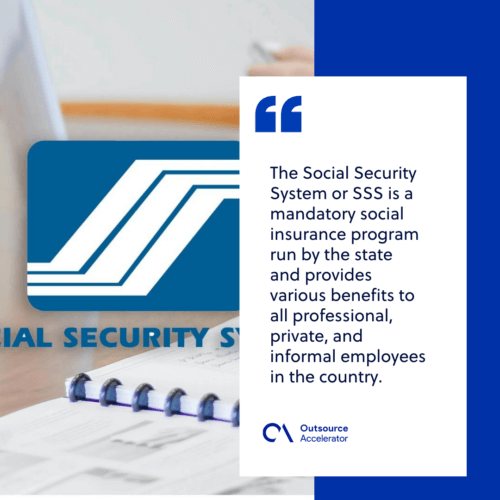
PhilHealth
PhilHealth covers the employee’s additional medical expenses. This is mandatory and automatically deducted from your monthly wages.
Just like SSS contributions, both the employer and employee are tasked to provide PhilHealth contributions each month.
The employee can use PhilHealth contributions in case of a medical emergency. If you are connected with a company, then you can ask HR about your monthly contributions.
If you are a freelancer or have a business, you might want to cover the contributions yourself.
Pag-IBIG
Pag-IBIG or the Home Development Mutual Fund (HDMF) covers the employee when it comes to housing loans. The law mandates it, and it is a compulsory monthly contribution, especially for company-employed professionals.
The HDMF covers Filipino workers by establishing a legal savings program for an affordable housing financing system. The employee then has the privilege to apply for short-term loans and access low-cost housing programs after a certain period of contribution.
Here is a sample computation for PhilHealth contributions: if the employee earns a job pay rate of PHP 1,500 or less per month, then they must contribute at least 1% per month.
If they earn a total job pay rate of PHP 1,500 and above per month, then they must contribute at least 2% of their monthly compensation. The maximum employee contribution is set at PHP 5,000, while the minimum is PHP 100.







 Independent
Independent




